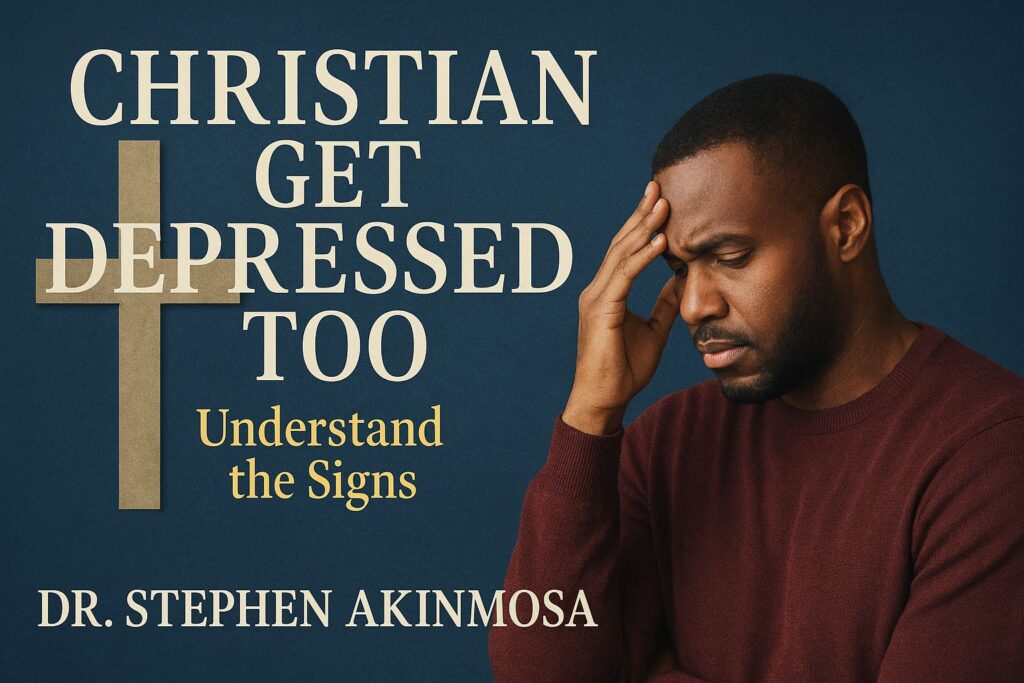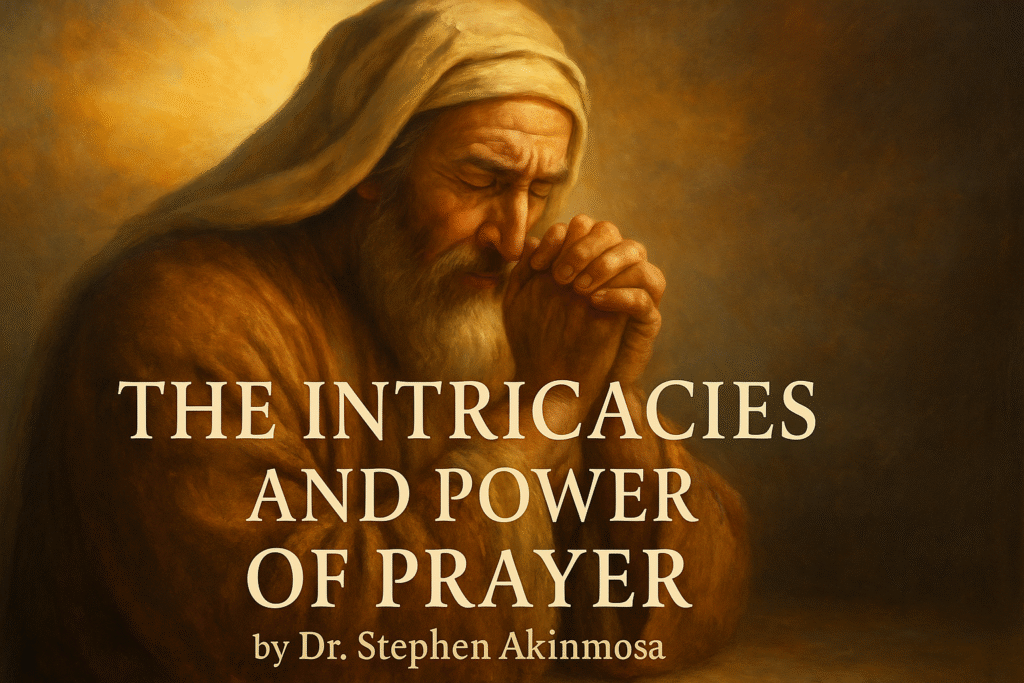*CHRISTIANS GET DEPRESSED TOO: Understand the Signs*
If you’re reading this, perhaps you’re carrying a weight that feels heavier than usual, or maybe you’re supporting someone who is. Let me start by assuring you: Christians get depressed too. It’s a truth that doesn’t diminish your faith; in fact, it can deepen it. The Bible is filled with stories of faithful people who wrestled with deep sorrow, despair, and what we might today call depression. Think of Elijah hiding in a cave, overwhelmed after a great victory (1 Kings 19), or David crying out in the Psalms about his soul being downcast (Psalm 42). Even Jesus, in the Garden of Gethsemane, experienced anguish so profound that His sweat was like drops of blood (Luke 22:44, NIV). You’re not alone in this. God sees you, loves you, and has grace abundant for these moments.
This message is meant to be a gentle companion on your journey—a comprehensive guide drawing from Scripture, practical counseling insights, and pastoral wisdom. We’ll explore when faith feels heavy, how to face the reality of depression, identify it in yourself, recognize signs without ignoring them, embrace it without shame, find grace for the broken, accept it, deal with it, and receive Christian advice tailored for healing. My prayer is that these words wrap around you like a warm embrace from the Father, reminding you of His unfailing love. Let’s walk through this together, step by step, with compassion and faith as our guides.
*When Faith Feels Heavy*
Sometimes, faith doesn’t feel like a soaring eagle but more like a burdened pilgrim trudging uphill. You might pray, read your Bible, attend church, and still feel an inexplicable heaviness. This isn’t a sign of weak faith; it’s a human reality in a broken world. The Apostle Paul spoke of being “hard pressed on every side, but not crushed; perplexed, but not in despair” (2 Corinthians 4:8, NIV). Notice he acknowledges the pressure and perplexity—it’s okay to feel it.
Pastorally, I encourage you to pause and reflect: What might be contributing to this heaviness? Is it grief from a loss, chronic stress, unmet expectations, or even seasonal changes? Practically, start a “faith journal.” Each day, write one thing you’re grateful for from God’s Word, even if it’s small, like Lamentations 3:22-23 (NIV): “Because of the Lord’s great love we are not consumed, for his compassions never fail. They are new every morning; great is your faithfulness.” This isn’t about forcing positivity but anchoring your soul in truth when emotions waver.
If the heaviness persists, talk to a trusted friend or pastor. Counseling tip: Normalize it by saying, “I’m feeling heavy in my faith right now—can we pray together?” Remember, Jesus invited His disciples into His own heaviness, asking them to watch and pray with Him (Matthew 26:38, NIV). Vulnerability invites community, and community lightens the load.
*Facing the Reality of Depression*
Depression isn’t just “feeling sad”—it’s a profound, often persistent low that affects body, mind, and spirit. As Christians, we might hesitate to name it, fearing it questions our salvation or God’s goodness. But facing reality is biblical: “The Lord is close to the brokenhearted and saves those who are crushed in spirit” (Psalm 34:18, NIV). God doesn’t shy away from our pain; He draws near.
In pastoral counseling, I’ve seen many believers liberated by simply acknowledging, “This might be depression.” It’s not denying faith; it’s honoring the truth that we live in fallen bodies in a fallen world (Romans 8:22-23, NIV). Practical advice: Educate yourself gently. Read resources like “Spurgeon’s Sorrows” by Zack Eswine, which shares how the great preacher Charles Spurgeon battled depression while clinging to Christ.
Compassionately, know that depression can stem from biological factors (like chemical imbalances), trauma, or spiritual warfare. Don’t rush to spiritualize it all—seek professional help if needed. A warm reminder: God isn’t disappointed in you for struggling. He’s the Great Physician who heals the whole person (Matthew 9:12, NIV).
*Identifying Depression in Yourself*
Self-awareness is key, but depression can cloud our vision. Start by tuning into your body and emotions with kindness, as if caring for a dear friend. Common indicators include persistent sadness, loss of interest in activities you once loved (anhedonia), changes in appetite or sleep, fatigue, feelings of worthlessness, or difficulty concentrating.
Biblically, reflect on Psalm 42:5 (NIV): “Why, my soul, are you downcast? Why so disturbed within me? Put your hope in God, for I will yet praise him, my Savior and my God.” David dialogues with his soul—try that in prayer. Ask God to reveal what’s happening inside.
Practically, use a simple checklist from counseling tools like the PHQ-9 (Patient Health Questionnaire), but adapt it faith-fully. Rate on a scale of 0-3 how often you’ve experienced: “Little interest or pleasure in doing things?” or “Feeling down, depressed, or hopeless?” If scores are high over two weeks, it’s time to seek help. Pastoral advice: Don’t go it alone. Share with a mentor who can pray and guide you toward resources, remembering James 5:16 (NIV): “Therefore confess your sins to each other and pray for each other so that you may be healed.”
*Signs Not to Ignore*
Depression whispers lies, but some signs shout for attention. Don’t ignore persistent thoughts of death or suicide—these are emergencies. Call a hotline or go to the ER immediately; it’s an act of courage and faith in God’s value on your life (Psalm 139:13-14, NIV).
Other red flags: Isolation from community, extreme irritability, unexplained physical aches, or neglecting self-care. Elijah ignored his exhaustion until God intervened with rest and food (1 Kings 19:5-8, NIV). Learn from that: God cares for your body too.
Counseling-focused tip: Track patterns in a mood journal. Note triggers, like unmet needs or relational strains. If signs disrupt daily life—work, relationships, faith practices—for more than two weeks, consult a doctor or therapist. Warmly, remember: Ignoring signs doesn’t make you stronger; addressing them honors God’s design for wholeness.
*Recognizing Depression Without Shame*
Shame often tags along with depression, whispering, “A real Christian wouldn’t feel this way.” But Scripture counters that: “There is now no condemnation for those who are in Christ Jesus” (Romans 8:1, NIV). Recognizing depression is an act of humility, not failure.
In pastoral care, I remind people that heroes of faith like Job felt utter despair: “Why did I not perish at birth… For now I would be lying down in peace; I would be asleep and at rest” (Job 3:11,13, NIV). Yet God met him there, without shame.
Practical step: Reframe your narrative. Instead of “I’m depressed because I’m weak,” say, “I’m experiencing depression, and God is with me in it.” Join a support group like Celebrate Recovery, where faith and vulnerability meet. Compassionately, give yourself permission to feel—God does.
*Depression Without Shame*
Building on recognition, let’s dwell in freedom from shame. Depression isn’t a sin; it’s a suffering. Jesus bore our shame on the cross (Hebrews 12:2, NIV), so we don’t have to carry it.
Warm pastoral advice: Meditate on Isaiah 61:3 (NIV), where God promises “a garment of praise instead of a spirit of despair.” This isn’t instant; it’s a process. Share your story selectively with safe people to break shame’s power.
Counseling insight: Practice self-compassion exercises, like writing a letter to yourself from God’s perspective: “My child, I see your pain and love you fiercely” (based on Zephaniah 3:17, NIV). Over time, this rewires shame into grace.
*Grace for the Broken*
Oh, friend, grace is God’s specialty for the broken. “But he said to me, ‘My grace is sufficient for you, for my power is made perfect in weakness’” (2 Corinthians 12:9, NIV). Depression reveals our weakness, inviting His strength.
Pastoral encouragement: Lean into sacraments like Communion, reminding you of Christ’s broken body for your wholeness. Practically, create a “grace ritual”—daily affirmations from Scripture, like Ephesians 2:8-9 (NIV): “For it is by grace you have been saved, through faith—and this is not from yourselves, it is the gift of God.”
In counseling, we emphasize rest in grace over striving. If medication or therapy is needed, see it as God’s provision, like manna in the wilderness (Exodus 16).
*Don’t Deny Depression, It’s Not a Stigma*
If depression has cast a shadow over your heart, please don’t deny it—naming it is an act of courage, not shame. As Christians, we sometimes fear that admitting depression labels us as “less faithful,” but that’s a lie. The Bible shows us faithful servants like David, who cried, “My soul is overwhelmed with sorrow to the point of death” (Psalm 55:4, NIV), and Elijah, who felt so desolate he wished to die (1 Kings 19:4, NIV). They didn’t hide their pain, and neither should you.
Denying depression can deepen its grip, isolating you from God’s healing through community, prayer, or professional help. It’s not a stigma—it’s a human struggle in a fallen world, and God meets you there with grace: “The Lord is close to the brokenhearted and saves those who are crushed in spirit” (Psalm 34:18, NIV).
Practically, start by whispering your truth to God or a trusted friend: “I’m struggling.” Seek a counselor if needed—God uses medicine and therapy as His tools, just as He used ravens to feed Elijah (1 Kings 17:4). Compassionately, know this: You’re not failing God by feeling depressed; you’re inviting Him into your honesty. Embrace His love, and let it guide you to hope without shame.
*Accepting Depression and Dealing with It*
Acceptance isn’t resignation; it’s surrender to God. “In his heart a man plans his course, but the Lord determines his steps” (Proverbs 16:9, NIV). Accept by naming it in prayer: “Lord, this depression is here; help me navigate it.”
Dealing practically: Build routines—exercise (even walks while praying), healthy eating, sleep hygiene. Therapy like CBT (Cognitive Behavioral Therapy) can help reframe thoughts, aligned with Philippians 4:8 (NIV): “Whatever is true… think about such things.”
Pastoral tip: Engage spiritual disciplines gently—short prayers, listening to worship music. If it’s severe, professional intervention is wise; God uses doctors too (Luke, the physician, wrote a Gospel!).
*Christian Advice for Depression*
Here’s tailored, faith-based advice:
1. Daily Anchor in Scripture: Start with Psalms—read one aloud, like Psalm 23 (NIV), personalizing it.
2. Prayer as Dialogue: Be honest: “God, I feel forsaken” (like Jesus in Matthew 27:46, NIV). Then listen for His whisper.
3. Community Support: “Carry each other’s burdens” (Galatians 6:2, NIV). Join a small group or counseling.
4. Professional Help: Seek Christian counselors integrating faith and psychology.
5. Self-Care as Stewardship: Honor your body (1 Corinthians 6:19-20, NIV) with rest, nutrition, hobbies.
6. Combat Lies with Truth: When depression says “hopeless,” counter with Jeremiah 29:11 (NIV): plans to prosper you.
7. Worship in the Valley: Sing even when you don’t feel it; it shifts atmospheres.
8. Serve Others Gently: Helping can heal, but start small.
9. Monitor Progress: Celebrate small victories; God’s working (Philippians 1:6, NIV).
10. Hope in Eternity: This too shall pass; Revelation 21:4 (NIV) promises no more tears.
Closing Pastoral Thoughts
Beloved, as we wrap this journey, know that depression doesn’t define you—Christ does. You’re a child of God, fearfully and wonderfully made, even in brokenness. If today feels dark, hold on; dawn comes. Reach out—I’m praying for you. May the God of hope fill you with all joy and peace as you trust in Him (Romans 15:13, NIV).







